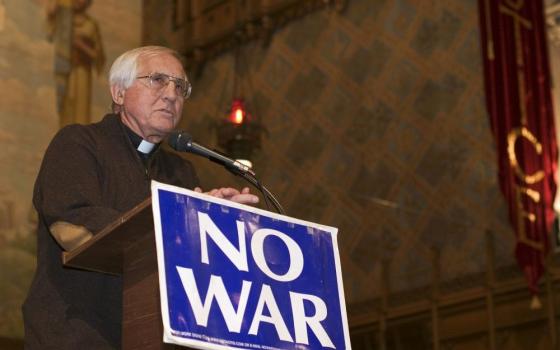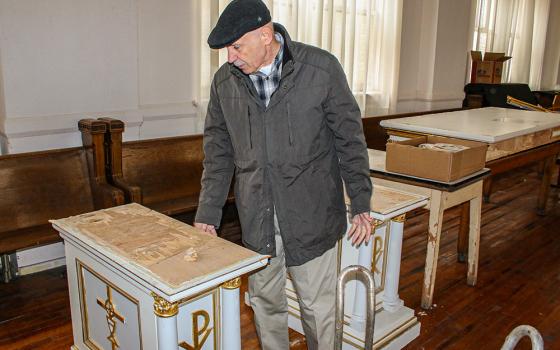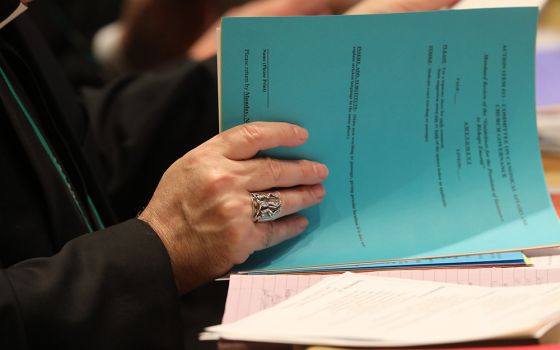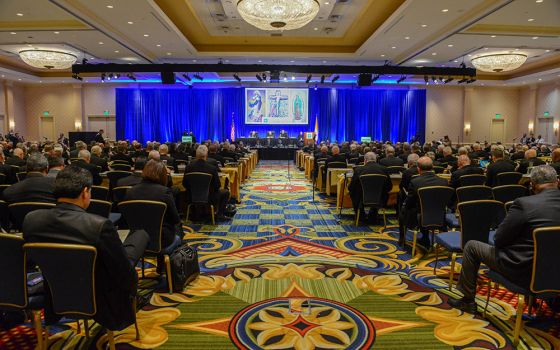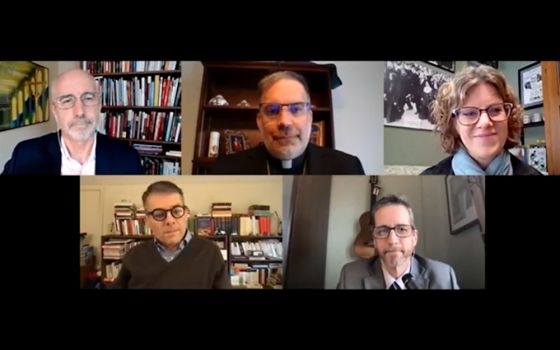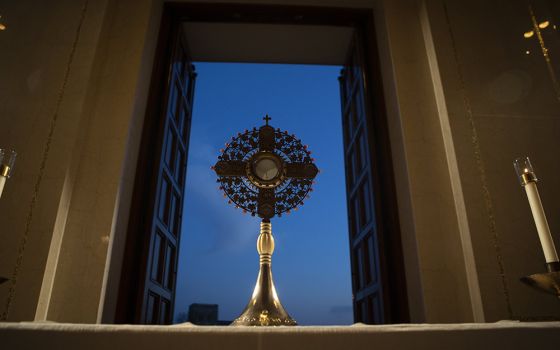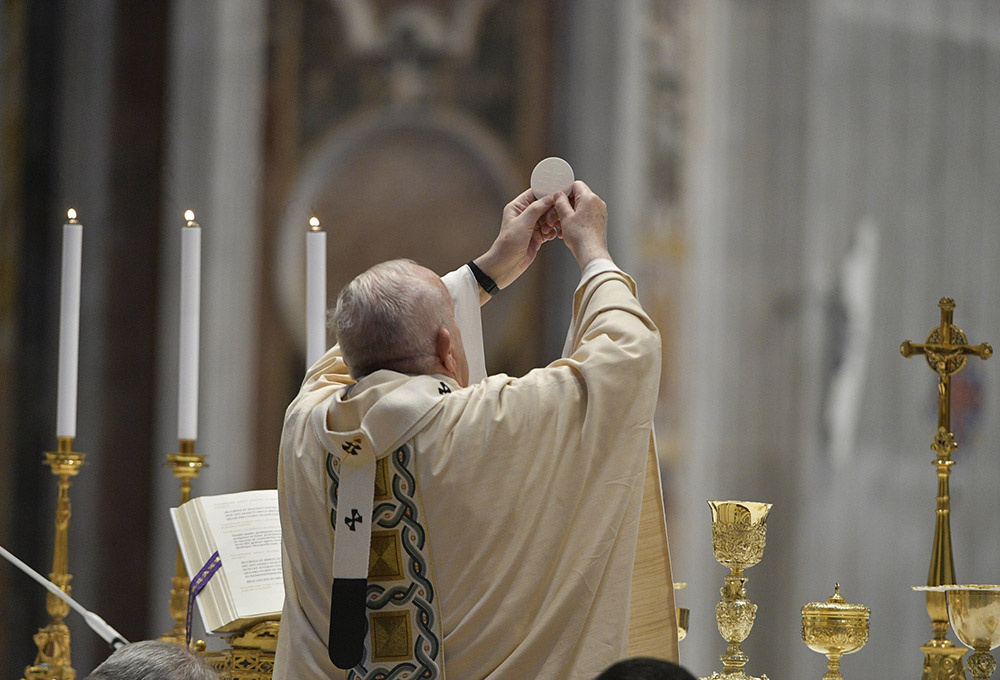
Pope Francis elevates the Eucharist during Easter Mass in St. Peter's Basilica at the Vatican April 4. (CNS/Vatican Media)
What Pope Francis thinks of the bid by a group of U.S. bishops to ban pro-choice Catholic politicians from Communion could only be second-guessed until the Vatican sent a firm reminder of certain home truths.
Unlike its legalistic and poorly framed document in March in response to a bishop's query about the blessing of same-sex unions, the Congregation for the Doctrine of the Faith's letter of May 7 to the bishops was clear, reasoned, reflective of Francis' own thinking, and obviously issued at his behest.
The key point by Congregation for the Doctrine of the Faith prefect Cardinal Luis Ladaria was that any statement by the U.S. bishops should not single out Catholic political leaders but be directed at churchgoing Catholics in general, reminding them of what the church teaches about their worthiness to receive Communion. In other words, it shouldn't be a power play, a means of coercion, designed to put pressure on certain public figures, for that is to press what is pure divine gift into political service.
It is the difference between Canon 916, which urges Catholics to present themselves properly for holy Communion, and Canon 915, which is about the minister denying holy Communion.
The first is teaching; the second is a juridical act of power. An example of the first is the 2007 CELAM document of Aparecida, whose chief drafter is now Francis, which urged "eucharistic coherence" in its Paragraph 436. Legislators, the Latin American bishops said, should be "conscious that they cannot receive holy communion and at the same time act with deeds or words against the commandments," notably in relation to abortion, euthanasia and other "grave crimes against life and family."
Is an act of power under Canon 915 ever justified? Certainly, in response to action that is "seriously disruptive of ecclesiastical or moral order," in the words of the canon. There are rare cases when, for example, as part of a protest — to gain publicity or notoriety, say — people present themselves for Communion. The priest would have no choice but to deny them.
"What the church is defending when it defends its integrity is its own identity," Cardinal Jorge Mario Bergoglio told the International Eucharistic Congress in Quebec City in 2008. "This gift, the most beautiful expression of which is the Eucharist, is not one gift among others, but the most intimate and complete self-giving of the Trinity given for the life of the world."
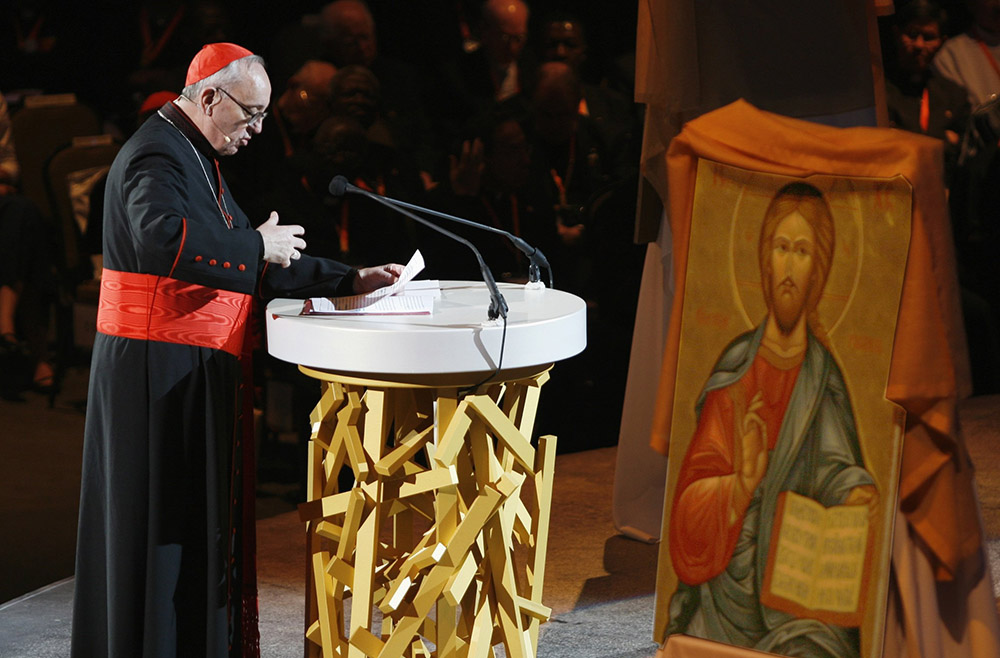
Then-Cardinal Jorge Mario Bergoglio of Buenos Aires, Argentina, delivers a catechesis June 18, 2008, during the Eucharistic Congress in Quebec City. (CNS/Catholic Times/Moussa Faddoul, SJ)
So yes, to protect the Eucharist as a sign of God's radical self-gift could — in theory, and in law — mean denying it publicly to people who wish publicly to use it for their own ends.
But for the same reason it cannot be used as a blanket measure to deny Communion to Catholic politicians who choose for whatever reasons — and there are many — not to vote to make abortion a criminal offense. Rather than protecting the church's identity as a sacrament for humanity that embodies God's radical self-gift in the cross, such a blanket ban risks undermining that identity.
As San Diego Bishop Robert McElroy recently argued, the proposal to exclude pro-choice Catholic political leaders from the Eucharist "will bring tremendously destructive consequences — not because of what it says about abortion, but because of what it says about the Eucharist."
Just as the true meaning of the Eucharist needs to be defended from those who would use it for publicity, it needs to be defended from those who would use it to divide the worthy from the unworthy.
As Francis famously said in Evangelii Gaudium, quoting early church fathers, the Eucharist "is not a prize for the perfect but a powerful medicine and nourishment for the weak." Yet all too often, "we act as arbiters of grace rather than its facilitators. But the Church is not a tollhouse; it is the house of the Father, where there is a place for everyone, with all their problems."
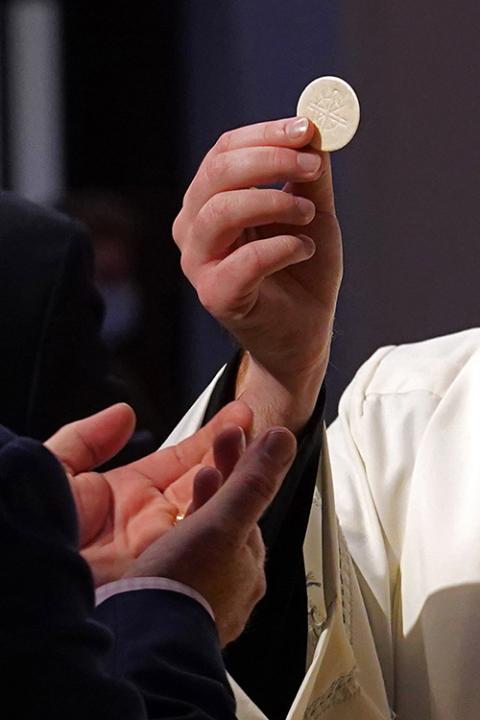
A priest gives the Eucharist to a communicant during a Mass at St. Agnes Cathedral in Rockville Centre, New York, in 2020. (CNS/Gregory A. Shemitz)
San Francisco Archbishop Salvatore Cordileone's recent pastoral letter urging the bishops to deny pro-choice politicians Communion cites Evangelii Gaudium's strong words against abortion, yet ignores Francis' clear warning in the same exhortation not to reduce the Catholic ethical offer to one or two issues alone.
Ladaria's letter highlights the point: It would be "misleading" if any new document "were to give the impression that abortion and euthanasia alone constitute the only grave matters of Catholic moral and social teaching that demand the fullest accountability on the part of Catholics."
Ironically, Cordileone cites the precedent of the civil rights struggle, when bishops threatened with excommunication those who opposed racial integration. If he were proposing a far more general ban from Communion of politicians who failed to uphold Catholic teaching on race, immigration, gun control and marriage as well as abortion and euthanasia, his would be a radical, prophetic stance; and as national policy, it would amount to the church effectively withdrawing from public life.
But to advocate a generalized ban uniquely on "pro-abortion" politicians receiving the Eucharist is not a prophetic but an ideological political act, one that misleads the faithful about the nature of the Eucharist, the mission of the church, as well as the ethical implications of the Gospel.
Can it be true, as Cordileone says, that if politicians who vote for abortion are not banned from the Eucharist, "this can lead Catholics (and others) to assume that the moral teaching of the Catholic Church on the inviolate sanctity of human life is not seriously held"? Is it not more likely that they will assume that moral teaching on other life matters — embryo research, guns, the death penalty — is not seriously held by the church, because the pro-ban bishops seem concerned only with pro-choice politicians?
With such arbitrary selectivity, "the edifice of the Church's moral teaching risks becoming a house of cards," as Francis puts it in Evangelii Gaudium. He warned, presciently, that such selectivity "would mean that it is not the Gospel which is being preached, but certain doctrinal or moral points based on specific ideological options."
Cordileone fears the sin of presumption, of people not confessing before receiving, and treating the graces of the Eucharist too lightly. That is a real and constant danger. Yet, when he says Catholics in public life who do not stand against abortion are guilty of "persistent, obdurate, and public rejection of Catholic teaching," what does he know of their struggles on the issue, the painful weighing up of goods? What room does he leave for the conscience of those who know abortion is wrong, yet believe it cannot be illegal as long as most people do not share that view? What of the prudential judgement of a politician, which must constantly choose which struggles to take on, and when?
Advertisement
It could be the case that a particular politician genuinely has a blind spot, disagrees with church teaching — whether on abortion, gun control or the death penalty — and simply ignores it. But such a case could only be known and dealt with by a one-to-one, private conversation between the politician and his or her bishop. If not, the danger of presumption is reversed, and the church rides roughshod over a politician's legitimate freedom of prudential judgment.
When the Jansenists of 17th-century France denounced the practice of giving the Eucharist to those whose repentance was perfunctory and so (they claimed) destined for hell, they were condemned by Rome, and frequent Communion became the norm. A new devotion to the Sacred Heart of Jesus, encouraged by the Jesuits, began to spread, dedicated to the proposition of God's burning love for all humanity, typified by regular Eucharist.
The Sacred Heart communicated the Gospel; the rigorism of Port-Royal did not. As Francis told Bolivia's national eucharistic congress in July 2015, the Eucharist is a missionary sacrament.
In an interview intended to be published after his death, which happened in August 2012, the great cardinal of Milan, Carlo Maria Martini, shocked the Catholic world with his powerful critique of a church in Europe and America that had grown tired and cold, ceasing to be missionary. One of the symptoms of the disenchantment he identified was the way the sacraments had become a means of policing and enforcing obedience to doctrine.
It was a symptom of what Henri de Lubac called spiritual worldliness, the use of the goods of the church for worldly ends. "The sacraments are not a disciplinary instrument, but a help for people on their journey, through the weaknesses of life," Martini said.
He went on to ask: "Are we bringing the sacraments to people who are in need of new strength?"
Down in Buenos Aires, Argentina, a few weeks later, Bergoglio borrowed Martini's metaphor of a fire that had died down, buried under layers of ash of worldliness. "How can the embers be freed from the ashes in order to rekindle the flame of love?" he asked in a retreat. The problem, Bergoglio said, was that "we have Jesus tied up in the sacristy." It was no longer about Jesus standing at the gate asking to be let in, he said, but the other way round, asking to be let out.

